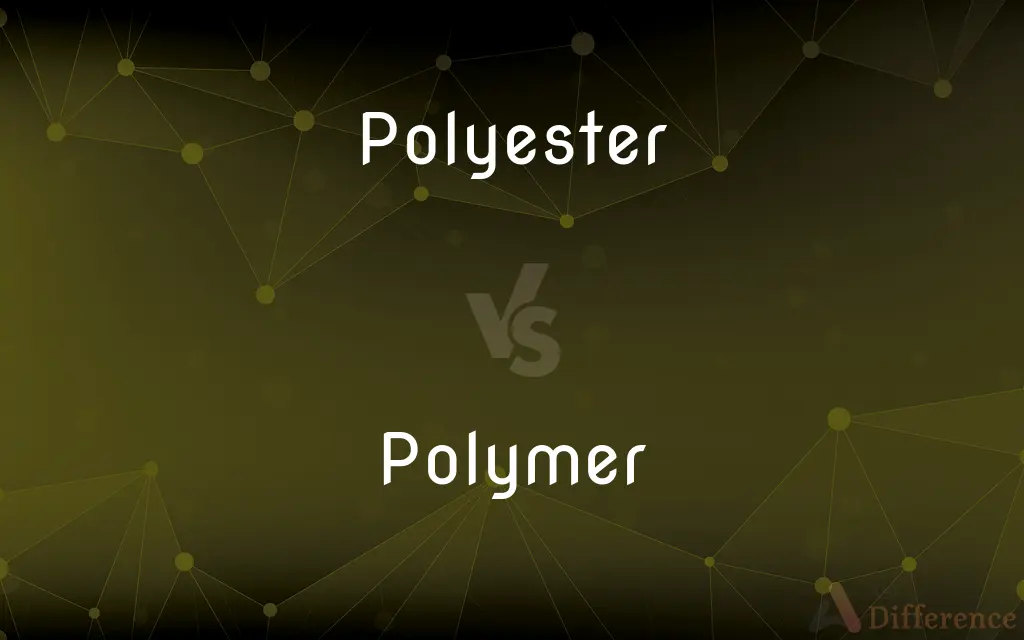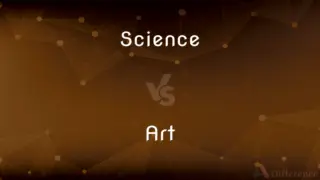Polyester vs. Polymer — What's the Difference?
Edited by Tayyaba Rehman — By Urooj Arif — Updated on April 5, 2024
Polyester is a specific type of polymer used mainly in fabrics and textiles, offering durability and chemical resistance, while polymers are large molecules comprising many repeated subunits, utilized across diverse industries.

Difference Between Polyester and Polymer
Table of Contents
ADVERTISEMENT
Key Differences
Polyester is a category of polymers known for their strength, resistance to shrinking and stretching, and quick-drying properties, making them ideal for clothing and furnishings. On the other hand, polymers encompass a vast range of natural and synthetic materials, including plastics, rubbers, and fibers, each with unique properties tailored to specific applications.
Polyesters are synthesized through a chemical reaction between an acid and alcohol, resulting in a material that's resistant to wrinkles and holds its shape well. Whereas polymers can be created through various polymerization processes, leading to materials that can be incredibly elastic, like rubber, or hard and durable, like polycarbonate plastics.
In terms of environmental impact, polyesters, particularly those derived from petroleum, pose challenges in recycling and biodegradability. Conversely, some polymers, like certain bioplastics, are designed to be more environmentally friendly, degrading more readily under specific conditions.
From a manufacturing perspective, polyester fibers can be engineered to various specifications, including fiber size and texture, enhancing their suitability for different textile applications. Polymers, depending on their composition and structure, are used in a wider array of manufacturing processes, from injection molding for automotive parts to 3D printing for prototyping.
In the realm of everyday use, polyester's role is most visible in the fashion and home décor sectors, where its properties are maximized for consumer goods. Polymers, by contrast, play a critical role in virtually every aspect of modern life, from packaging materials and household products to high-tech gadgets and medical devices.
ADVERTISEMENT
Comparison Chart
Definition
A synthetic polymer made by reacting acid with alcohol.
A large molecule composed of many repeated subunits.
Primary Use
Textiles, clothing, and furnishings.
Wide range, including plastics, fibers, and rubber.
Production Process
Polycondensation reaction.
Various polymerization methods (addition, condensation).
Environmental Impact
Challenges in recycling and biodegradability.
Varies widely; some are biodegradable, others are not.
Material Properties
Durable, wrinkle-resistant, quick-drying.
Ranges from elastic to hard, tailored to specific uses.
Compare with Definitions
Polyester
Polyester resins are used in fiberglass manufacturing, offering chemical resistance.
The boat's hull is reinforced with polyester resin for added toughness.
Polymer
Natural polymers include DNA and proteins, vital for biological functions.
DNA is a polymer that stores genetic information.
Polyester
A material used in the production of various consumer goods, offering high strength and elasticity.
The lightweight polyester blend makes the jacket both comfortable and resilient.
Polymer
Polymers can be thermoplastic, easily moldable upon heating.
Polycarbonate is a thermoplastic polymer used in safety glasses.
Polyester
In packaging, polyester films provide moisture and barrier protection.
Snack foods are often packaged in polyester film to preserve freshness.
Polymer
Thermosetting polymers do not remelt upon heating.
Bakelite, a thermosetting polymer, is used for electrical insulators and kitchenware.
Polyester
A synthetic fabric made from petroleum-based products, known for its durability.
The new line of outdoor wear features polyester that withstands harsh weather conditions.
Polymer
Biodegradable polymers are designed to break down in the environment.
Polylactic acid is a biodegradable polymer used in compostable bags.
Polyester
For home furnishings, polyester offers a cost-effective and durable option.
Polyester curtains are popular for their long-lasting color and easy maintenance.
Polymer
Substances with a molecular structure consisting chiefly or entirely of a large number of similar units bonded together.
Polyethylene, a polymer, is widely used in packaging.
Polyester
Polyester is a category of polymers that contain the ester functional group in every repeat unit of their main chain. As a specific material, it most commonly refers to a type called polyethylene terephthalate (PET).
Polymer
A polymer (; Greek poly-, "many" + -mer, "part") is a substance or material consisting of very large molecules, or macromolecules, composed of many repeating subunits. Due to their broad spectrum of properties, both synthetic and natural polymers play essential and ubiquitous roles in everyday life.
Polyester
A synthetic resin in which the polymer units are linked by ester groups, used chiefly to make synthetic textile fibres.
Polymer
Any of numerous natural and synthetic compounds of usually high molecular weight consisting of up to millions of repeated linked units, each a relatively light and simple molecule.
Polyester
Any of numerous synthetic polymers produced chiefly by reaction of dicarboxylic acids with dihydric alcohols and used primarily as light, strong, weather-resistant resins in boat hulls, textile fibers, adhesives, and molded parts.
Polymer
(organic chemistry) A long or larger molecule consisting of a chain or network of many repeating units, formed by chemically bonding together many identical or similar small molecules called monomers. A polymer is formed by polymerization, the joining of many monomer molecules.
Polyester
A wrinkle-resistant fabric of fibers made from any of these resins.
Polymer
A material consisting of such polymer molecules.
Polyester
Any polymer whose monomers are linked together by ester bonds
Polymer
Any one of two or more substances related to each other by polymerism; specifically, a substance produced from another substance by chemical polymerization.
Polyester
A material or fabric made from polyester polymer
Polymer
A naturally occurring or synthetic compound consisting of large molecules made up of a linked series of repeated simple monomers
Polyester
Of, or consisting of polyesters
Polyester
Any of numerous synthetic resins; they are light and strong and weather resistant
Polyester
A complex ester used for making fibers or resins or plastics or as a plasticizer
Polyester
Any of a large class of synthetic fabrics
Common Curiosities
What makes polyester different from other polymers?
Polyester is a specific type of polymer with characteristics ideal for textiles, such as durability and resistance to wrinkling, while polymers, in general, have a broader range of properties and uses.
Are polyesters only used in clothing?
No, polyesters are also used in packaging, home furnishings, and industrial applications due to their versatile properties.
How can the environmental impact of polyester and polymers be mitigated?
Through recycling, using biodegradable options where possible, and developing new, more sustainable manufacturing processes.
Can all polymers be recycled?
Not all polymers are recyclable; it depends on their chemical structure and the recycling technology available.
What's the difference between a polymer and a plastic?
All plastics are polymers, but not all polymers are plastics. Plastics are a type of synthetic polymer with properties suitable for manufacturing.
What are the environmental impacts of polymers?
The impact varies; some polymers, like certain bioplastics, are more environmentally friendly, while others, like many synthetics, are less biodegradable and harder to recycle.
How are polyesters made?
They are synthesized through a chemical reaction known as polycondensation, involving an acid and alcohol.
What role do polymers play in modern technology?
Polymers are essential in various applications, from electronic devices and medical equipment to automotive parts and sustainable packaging solutions.
Can polyester be blended with other fibers?
Yes, it's often blended with cotton and other natural fibers to enhance durability, texture, and moisture-wicking properties.
How does the use of polymers affect energy consumption?
The production and disposal of polymers can be energy-intensive, but advancements in polymer science are aimed at reducing energy consumption and improving efficiency.
Are there natural polymers?
Yes, examples include cellulose, rubber, DNA, and proteins.
What are the key properties of polymers that make them versatile?
Properties like malleability, resistance to chemicals and temperature, and electrical conductivity contribute to their versatility.
Why is polyester preferred for outdoor clothing?
Its resistance to water and wind, along with durability and ease of care, makes it suitable for outdoor apparel.
Can polymers be designed to have specific properties?
Yes, through chemical synthesis and processing techniques, polymers can be engineered to meet specific requirements for a wide range of applications.
What advancements are being made in polymer technology?
Innovations include biodegradable polymers, improved recycling methods, and polymers designed for specific high-performance applications.
Share Your Discovery

Previous Comparison
Science vs. Art
Next Comparison
Cliche vs. MetaphorAuthor Spotlight
Written by
Urooj ArifUrooj is a skilled content writer at Ask Difference, known for her exceptional ability to simplify complex topics into engaging and informative content. With a passion for research and a flair for clear, concise writing, she consistently delivers articles that resonate with our diverse audience.
Edited by
Tayyaba RehmanTayyaba Rehman is a distinguished writer, currently serving as a primary contributor to askdifference.com. As a researcher in semantics and etymology, Tayyaba's passion for the complexity of languages and their distinctions has found a perfect home on the platform. Tayyaba delves into the intricacies of language, distinguishing between commonly confused words and phrases, thereby providing clarity for readers worldwide.
















































